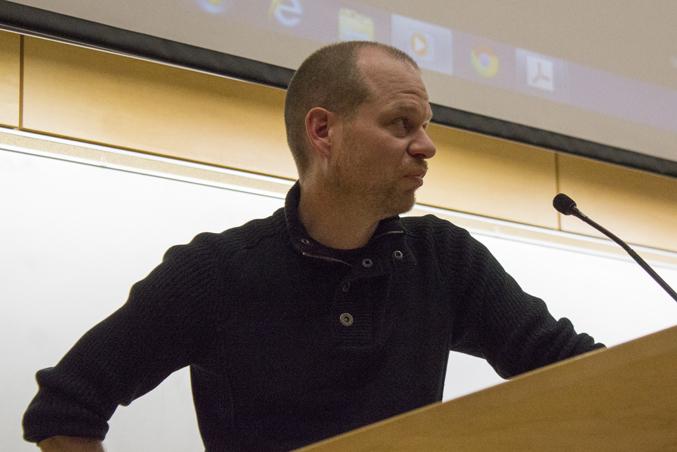By Jake Kivanc
The International Issues Discussion (IID) series presented its sixth lecture of the year Wednesday night, this time featuring war documentarian Patrick Reed.
Reed, whose films have covered numerous international issue and conflicts, spoke to a room of two dozen people at the George Vari Engineering Building about his past work as a filmmaker and his thought process when creating new documentaries.
Since leaving a PhD program in history, Reed has produced a number of African-focused documentaries over the past decade, such as Shake Hands With the Devil, a 2007 film about a revisit to Rwanda with Romeo Dallaire, the Canadian general reknown for heading the UN peacekeeper operation during the 1994 genocide that occurred in the country.
Originally, Reed had intended to have the film, set 10 years after the Rwandan genocide, cover the anti-apartheid movement through eyes of Rwanda’s local populace, but admitted that he was unable to get funding for the project until getting the starpower of Dallaire on board.
“It’s a weird situation where 800,000-plus people died in Rwanda and for a lot of people in West, the face of the genocide is a white, Canadian general,” he said, referring to Dallaire’s ability to engage western audiences.
Reed has also covered other high-profile Westerners that have been involved in African conflict, one of which being Dr. James Orbinski, the Canadian surgeon responsible for founding Doctors Without Borders, a humanitarian relief organization that works to save lives of victims within war-torn areas or places of disease outbreak.
The 2008 film, titled Triage, follows Orbinski as he returns to Africa to reevaluate his experiences as a physician and what it means to be a humanitarian.
During a clip Reed played for the audience, Orbinski recalls a haunting experience from the Rwandan genocide in which he was operating on a woman who had been brutally maimed from head-to-toe and how he had felt he failed as a doctor.
Reed said that while much of his work focuses on dark subjects, he makes an effort to connect with the “human problem”.
“My hope, if nothing else, is you walk out of that film and this guy – his story – has touched you,” he said, referring to one of the characters Orbinski meets in Triage. “If you see a news story about famine and happen to hang out with people who have survived that famine, then a picture of that person, a real person, that you got to know through the film, pops in your mind, rather than a wallpaper of suffering.”
Following the 2010 release of The Team, a film following a group of Kenyan reality stars who get pulled into the region’s civil war, Reed and his studio created Fight Like Soldiers, Die Like Children in 2012. The documentary, based off Dallaire’s book of the same name, focuses on his quest to end Rwanda’s child soldier epidemic.
Currently, Reed is working on his newest film, Guantanmo’s Child, a chronology of the effort to have Canadian citizen and ex-Guantanamo Bay prisoner Omar Khadr released pending claims that he has been unjustly imprisoned following his capture in 2002 Afghanistan.
Reed is producing the documentary in conjunction with Toronto Star investigative reporter Michelle Shephard, who has been working on the film for over a year-and-a-half with him.










Leave a Reply